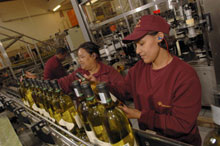Distell has reported that growing by 3.6%, its revenue rose to R6.9 billion on a sales volume increase of 2.8% for the six months to December 2010, despite battling a strong local currency and the persistent curb on spending brought on by the global downturn. This was due to the diversity of both its portfolio and trading destinations.

Distell MD Jan Scannell
Group MD Jan Scannell said, however, that the impact of the reasonable sales gains achieved had been undermined by adverse exchange rates and, to a lesser extent, a less profitable sales mix. "The strength of the rand also negated many of the benefits we would have derived from improved throughput and better operating efficiencies. As a result, profitability and margins were affected."
Operating profit declined marginally by 0.1%, while the net operating margin was slightly lower at 13.8% (2009: 14.3%). Headline earnings rose 1.2% to R630.6 million compared with a drop of 1.9% in the previous half-year reporting period. Headline earnings per share increased by 0.9%. An interim cash dividend of 124c per share has been declared, equal to the previous year's interim payment.
Domestic sales increase
In the domestic market, sales volumes increased by 3.2% and revenue by 6.2%. "Trading conditions remained exceptionally challenging with all players intensifying their competitive initiatives to attract consumer spend. The strong currency also made the country an increasingly attractive proposition for foreign brands, whose owners were able to market very aggressively on price."
Local sales growth in cider and RTD (ready-to-drink) brands had offset the marginal decline in wine sales and had helped to compensate for the drop experienced across the company's spirits portfolio.
International sales reflect cider interest
International sales volumes, including Africa, increased by 1.6%, reflecting a more favourable sales mix. Most of the growth had come from ciders and RTDs, Scannell said, with spirits volumes showing marginal growth. "Nevertheless we were very encouraged by the performances of Amarula and Bisquit, the cognac brand we acquired in 2009. Amarula's growth has come in the wake of the increased visibility brought about by the brand's association with the 2010 FIFA World Cup. Identified as one of the fastest-growing liqueur brands internationally, it also received a strong vote of confidence from the on-trade."
He added that the solid performance of Bisquit underscored the company's ability to take on a foreign brand, tap its global potential and build its profile in key markets.
Although wine export volumes had declined, mostly as a result of Europe's slow recovery from the recession, the company had managed to improve its share of South Africa's total bottled wine exports for the period. "Our share is strengthening in the packaged sector, which is where we believe the long-term sustainability of the industry lies."
He pointed out that, while wine sales had been under pressure in Europe, volumes had remained relatively stable in North American and Asia. "They also picked up in Latin America, proving once again the merit of the company's investment in raised exposure through last year's soccer tournament."
The stronger rand against all major currencies had been the reason for the marginal decline in revenue derived from international markets. "This is a problem South Africa shares with other New World players such as Australia and Chile, where producers have all been hurt by currencies that have strengthened considerably against those of our trading partners in Europe and North America."
Africa, however, had continued to deliver strong growth, contributing 64.1% to foreign revenue.
Investing in infrastructure
Scannell said the company was continuing to invest in infrastructure in many of its key markets and was introducing additional measures to promote its cost-efficiency.
Net financing costs had decreased from R44.9 million to R27.7 million due to lower average borrowings during the period. Total assets increased by 6.8% to R8.8 billion. Capital expenditure amounted to R90.5 million, of which R54.3 million was spent on the replacement of assets. A further R36.2 million was directed mainly to the expansion of cider, sparkling wine and whisky production capacity.
Delayed recovery
He added that although there were indications of a global economic recovery, lingering vulnerabilities still remained in some parts of the world, including some European markets. Moreover, widespread unemployment and limited disposable income were likely to continue to impact adversely on consumer spending.
"Just as the impact of the recession was not immediately felt in the liquor industry, so the impact of the recovery will be delayed. Even so, we expect the trading environment to stay extremely competitive, both domestically and internationally. However, we continue to have confidence in the inherent strength and continued relevance of our diverse and well-balanced portfolio. Our brands are very well accepted and perceived as offering good value.
"Our portfolio is also backed by excellent quality credentials, strong service levels and well-established routes to market. These features give us the foundation and scaffolding to continue to compete effectively, while maximising trading opportunities and profitability," he concluded.





































